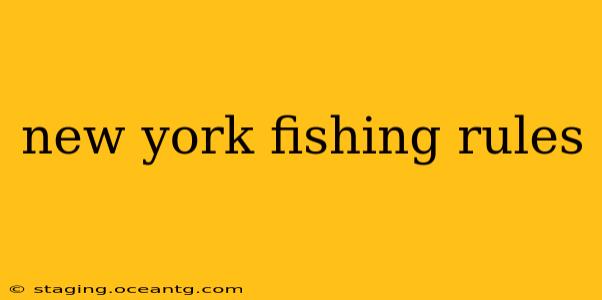New York State boasts diverse fishing opportunities, from the sparkling waters of the Great Lakes to the rushing rivers of the Adirondacks. However, navigating the regulations can be tricky. This comprehensive guide breaks down New York's fishing rules, ensuring you're legally and responsibly enjoying your angling adventures. We'll cover licensing, size and catch limits, seasons, and specific regulations for popular species.
What Fishing License Do I Need in New York?
New York requires a fishing license for anyone 16 years or older who fishes in state waters. There are several license types available, including:
- Resident License: For New York State residents.
- Non-Resident License: For individuals who do not reside in New York.
- Short-Term License: Available for a limited number of days.
- Lifetime License: A one-time purchase for lifetime fishing privileges (available to residents only).
You can purchase licenses online, at participating sporting goods stores, or through the New York State Department of Environmental Conservation (NYSDEC) website. Remember to carry your license with you while fishing; you'll need to present it upon request from a conservation officer.
What if I'm fishing on private property?
Even if you're fishing on private property, you still generally need a New York fishing license unless the property owner specifically grants you permission to fish without one. It's always best to check with the landowner to avoid any legal issues.
New York's Size and Catch Limits: Understanding the Regulations
New York has specific size and catch limits for many fish species. These limits are designed to protect fish populations and ensure sustainable fishing for future generations. Exceeding these limits can result in significant fines. The limits vary greatly depending on the species and the body of water.
For example, the minimum size limit for Largemouth Bass might be 12 inches in one lake, and 14 inches in another. Similarly, the daily catch limit for trout might be 5 in one stream and 3 in another. Always check the NYSDEC website for the most up-to-date information specific to the body of water you plan to fish. The regulations are often detailed by region and specific water body.
What are the penalties for exceeding catch limits?
Penalties for exceeding size or catch limits in New York can range from warnings and fines to the suspension of fishing privileges. The severity of the penalty will depend on the extent of the violation. It's crucial to understand and adhere to the regulations to avoid any legal repercussions.
Fishing Seasons in New York: When Can I Fish?
Many fish species in New York have specific open and closed seasons. These seasons are in place to protect fish during critical breeding and spawning periods. Fishing during a closed season is illegal and carries penalties. The NYSDEC website provides detailed seasonal information for various species and locations.
Are there any year-round fishing opportunities in New York?
Yes, some species can be fished year-round, while others have specific seasons. Always refer to the NYSDEC regulations to ensure you are fishing during the appropriate season for the target species.
Popular New York Fish Species and Their Regulations:
This section would ideally list popular fish species (e.g., Lake Trout, Bass, Salmon, etc.) and briefly summarize the key regulations (size & catch limits, season, etc.) for each. Due to the extensive nature of this information and its frequent updates, referring directly to the NYSDEC website is crucial for accurate and current data.
Where Can I Find More Information on New York Fishing Regulations?
The most reliable source for up-to-date and detailed information on New York fishing regulations is the New York State Department of Environmental Conservation (NYSDEC) website. This website provides comprehensive guides, maps, and frequently asked questions related to fishing in New York.
By adhering to these rules and regulations, you can contribute to the conservation of New York's valuable fish populations and ensure enjoyable fishing for years to come. Remember to always check the NYSDEC website for the latest updates before you head out for a fishing trip.
